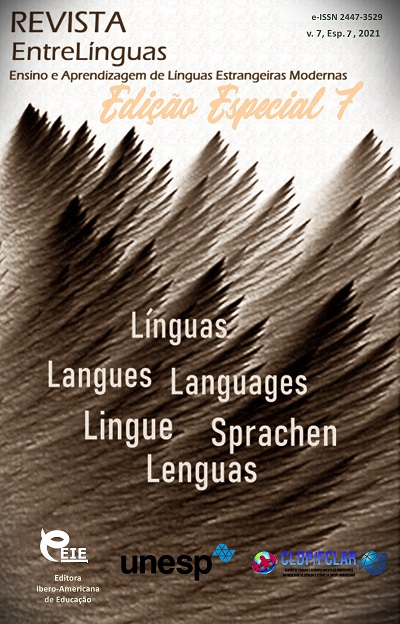El sistema del lenguaje y su funcionamiento en el habla
DOI:
https://doi.org/10.29051/el.v7iesp.7.16310Palabras clave:
Lenguaje y habla, Significado, Ambigüedad, Lingüística cognitivaResumen
En la era imperante, el problema de estudiar la semántica de una unidad léxica se enfrenta a la totalidad del complejo "pensamiento - sistema de lenguaje - habla", lo que implica al equipo de científicos de múltiples segmentos. Por lo tanto, el presente artículo intenta proporcionar pruebas suficientes de la naturaleza no reflexiva del lenguaje y el habla. La observación lingüística, el método descriptivo, la comparación como método lingüístico universal se utilizan para cumplir con el objetivo del estudio. Se ha demostrado que una forma lingüística, que, por regla general, el diccionario describe como una que tiene muchos significados metafóricos figurativos, se interpreta como inequívoca en el sistema del lenguaje. Surgen nuevos significados, son ordenados por el hablante y el oyente en el proceso de comunicación, en el marco de un enunciado. Por lo tanto, la polisemia puede verse no como un fenómeno de palabras en el sistema del lenguaje, sino como un fenómeno de un enunciado en el habla.
Descargas
Citas
Arkhipov I. К. Communicative Zeitnot and Prototypical Semantics // Herald of Herzen Uni-versity № 4 (7). – SP.: RSPU, 2004. (in Russian)
Boikova I. B. The Sign Structure and Language Functionality // Proceedings of the 3rd Inter-national Workshop on Cognitive Linguistics. Part 2. – Tambov, 2002. [in Russian]
Buslaev F. I. Historical Grammar of the Russian Language. – М.: Science, 1959. [in Russian]
Gardiner A. Difference Between “Speech” and “Language” // V. А. Zvegintsev. The History of Linguistics of 20th-19th Centuries in Essays and Abstracts. P. 2. М.: Progress, 1965. [in Russian]
Grechko V. А. The Theory of Linguistics: Manual. – М.: Higher School, 2003. [in Russian]
Guillaume G. The Principles of Theoretical Linguistics. М.: Progress, 1992. [in Russian]
Humboldt W. Selecta on Linguistics. М: Progress, 2001. [in Russian]
Karamalak O., Pesina S. Linguistic sign and reading as text creating activity // Linguae Slov-enska Vzdelavacia a Obstaravacia s.r.o. Vol. 1 (2017), P. 2-14. DOI: 10.18355/XL.2017.10.01.01 ISSN: 1337-8384
Lomtev Т. P. General and Russian Linguistics. – М: Наука, 1976. [in Russian]
Lyons J. Introduction into Theoretical Linguistics – М.: Progress, 1978. [in Russian]
Lyons J. Language and Linguistics. Introductory Survey. – М: Editorial URSS, 2004. [in Russian]
Mednikova E. М. The Meaning of a Word and Methods of its Study. – М., 1974. [in Russian]
Paul H. Principles of the History of Language. – М.: Progress, 1960. [in Russian]
Pavlov V. М. Language Capacity of an Individual as an Object of Linguistic Science // The Theory of Speech Activity. – М., 1968. [in Russian]
Pesina S., Latushkina O. Polysemy and Cognition // Procedia - Social and Behavioral Scienc-es, Vol. 192, 24 (2015), P. 486 – 490.
Pesina S., Pulekha I., Tandon P., Functional Peculiar properties of Lexical Markers in the English Language, Gumanitarno-pedagogicheskie issledovaniya [Humanitarian and pedagogical Research], vol. 3, no 1, P.76 81. (2019) [in Russian]
Pesina S., Solonchak T. Word Functioning in Communication Process // Procedia - Social and Behavioral Sciences, Vol. 192, 24 (2015), P. 346 – 351.
Pesina S., Yusupova L. Words Functioning in Lexicon // Procedia - Social and Behavioral Sciences, Vol. 192, 24 (2015), P. 38 – 43.
Pesina S.A., Churilina L.N., Skvortsova M.L., Kozhushkova N.V., Baklykova T.Yu., Teren-tieva N.G. Functioning of polysemantic words in the lexicon // Applied Linguistics Research Journal. 2020. V. 4. № 9. P. 64-69. DOI: 10.14744/alrj.2020.24855
Pesina, S.A. Multi-level structure of polysemous word: Invariant-cluster analysis // Voprosy Kognitivnoy Lingvistikithis, 2021(1), PP. 60–69. DOI: 10.20916/1812-3228-2021-1-60-69, 2й квартиль, Импакт 0,922
Potebnya А. А. Notes from Russian Grammar. Vol. 1-2. М.: Science, 1959. [in Russian]
Saussure Ferdinand de. Course in General Linguistics. М.: Logos, 1998. [in Russian]
Solonchak T., Pesina S. Language Ability and Word Functioning // Procedia - Social and Be-havioral Sciences, Vol. 192, 24 (2015), P. 447 – 452.
Zvegintsev V. А. Language and Linguistic Theory. – М.: Editorial URSS, 2001. [in Russian]
Descargas
Publicado
Cómo citar
Número
Sección
Licencia

Esta obra está bajo una licencia internacional Creative Commons Atribución-NoComercial-CompartirIgual 4.0.
Os manuscritos aceitos e publicados são de propriedade da Revista EntreLínguas. Os artigos publicados e as referências citadas na Revista EntreLínguas são de inteira responsabilidade de seus autores.
Transferência de direitos autorais – autorização para publicação
Caso o artigo submetido seja aprovado para publicação, já fica acordado que o(s) autor(es) autoriza(m) a UNESP a reproduzi-lo e publicá-lo na EntreLínguas, entendendo-se os termos “reprodução” e “publicação” conforme definição respectivamente dos incisos VI e I do artigo 5° da Lei 9610/98. O artigo poderá ser acessado pela rede mundial de computadores (Internet), sendo permitidas, a título gratuito, a consulta e a reprodução de exemplar do artigo para uso próprio de quem a consulta, desde que haja a citação ao texto consultado. Essa autorização de publicação 328 EntreLínguas, Araraquara, v. 1, n .2, p. 323-328, jul./dez. 2015 não tem limitação de tempo, ficando a UNESP responsável pela manutenção da identificação do(s) autor(es) do artigo. Os artigos publicados e as referências citadas na Revista EntreLínguas são de inteira responsabilidade de seus autores.











